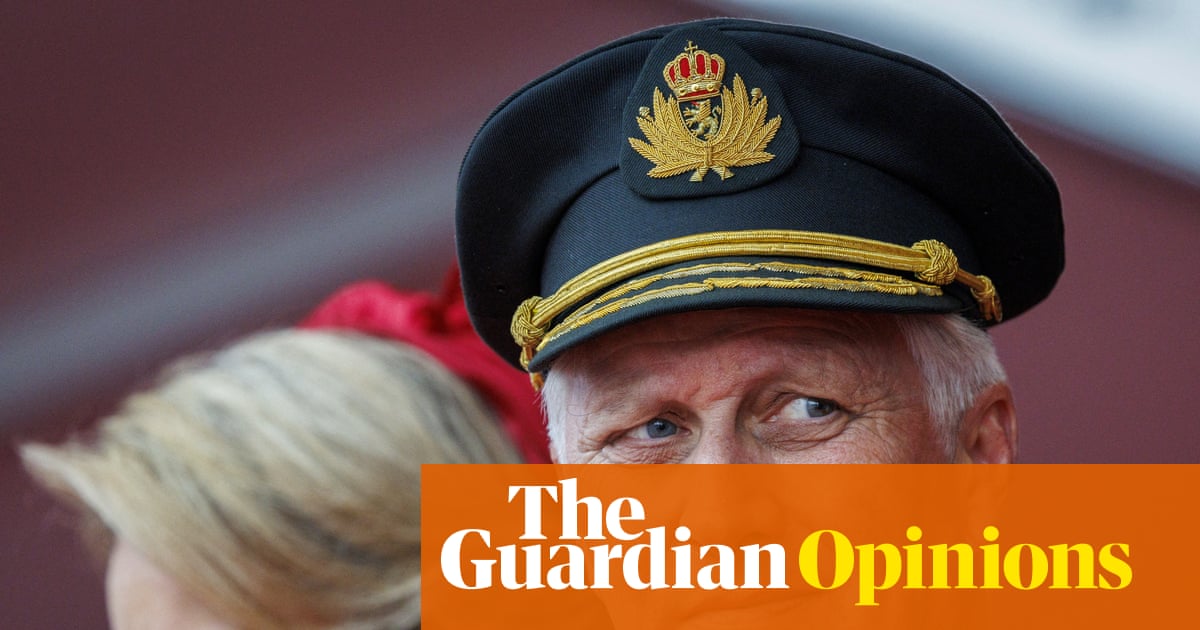Just when it seemed that Europe’s moral failure over Gaza was complete, the head of state of one EU country has stood up with a powerful message of moral clarity. King Philippe of Belgium, whose direct political statements are rare, condemned the grave humanitarian abuses in Gaza as “a disgrace to humanity”.
In a televised address to mark Belgium’s national day on 21 July, Philippe said: “I stand with all those who denounce the grave humanitarian abuses in Gaza, where innocent civilians, trapped in their enclave, are dying of hunger and being killed by bombs.” The monarch said he fully supported the calls of the UN secretary general, António Guterres, to end “this unbearable crisis”. From the royal palace in Brussels, the king added: “The current situation has dragged on for far too long. It is a disgrace to humanity.”
After a weekend in which at least 100 people across Gaza were killed as they sought food and water – violence that elicited no formal EU response – the monarch’s message stood out. He spoke of a recent meeting with Rami Elhanan and Bassam Aramin – two fathers, one Israeli and one Palestinian, who had each lost a daughter in earlier outbreaks of violence in the Middle East. “They have put aside any desire for revenge and have chosen to transform their pain into a message of peace,” he said. “It is always human dignity that is at stake.”
The king’s speech resonated beyond Belgium. The Dutch national broadcaster NOS openly questioned why King Willem-Alexander of the Netherlands had not made a similar statement.
As a constitutional monarch, Philippe has limited formal powers. His two annual addresses – on Belgium’s national day and Christmas Eve – are reviewed by the prime minister before broadcast. But this year’s remarks stood in sharp contrast to the federal government and the prime minister, Bart De Wever, a Flemish nationalist. His party, the New Flemish Alliance (N-VA), Belgium’s largest, includes several outspoken defenders of Israel’s military operations in Gaza. De Wever has resisted calls to impose sanctions on Israel. He even questioned whether Belgium would arrest Benjamin Netanyahu, as international law would require if the Israeli prime minister were to visit the country.
Transcending domestic politics, Philippe issued a broader call to action: “Europe must assert its leadership even more strongly. It must stand as a bulwark against – and a worthy alternative to – the brutal power struggles we are witnessing today.”
Given the EU’s intolerable silence on Israel’s war crimes, human rights violations and the deepening humanitarian catastrophe, it was a relief to hear at least one head of state speak the truth out loud. EU foreign ministers meeting in Brussels last week failed to take action against Israel, prompting an accusation of “cruel and unlawful betrayal” of Palestinians from Amnesty International. Emmanuel Macron’s announcement that France would recognise Palestinian statehood in September, while important, remains symbolic in the absence of any economic, financial or diplomatic sanctions.
The king, who was speaking just days after an audience with humanitarian organisations working in Gaza, highlighted the failure to uphold international law. “For decades, international law was the cornerstone upon which states could rely,” he said. “Today, that is being openly called into question. But when international law is trampled, the whole world suffers. Unpredictability and violence are then given free rein.”
While praising collective efforts to meet challenges such as the climate crisis, digital transformation and defence cooperation, Philippe urged EU leaders to “remain true to our values: democracy, justice and the rule of law”. In a political landscape increasingly dominated by realpolitik, here was a voice insisting on the ethical foundations of the European project.
The Belgian king has a consistent record of opposing discrimination and upholding human rights. After a deadly terror attack on the Jewish museum in Brussels in 2014, he made an official visit to the site. In 2015, he invited a large delegation of rabbis and Jewish community leaders to the palace after the dismantling of Islamist terrorist cells in Brussels and Verviers.
His moral stance has deep roots in the Belgian monarchy. His great-grandmother Queen Elisabeth was recognised by Yad Vashem as one of the Righteous Among the Nations. During the second world war, she used her position as queen mother to intervene on behalf of Jews facing deportation. According to Yad Vashem, “these interventions by a member of a royal family in Europe on behalf of Jews were unparalleled”.
Since its independence in 1830, Belgium has granted full civil rights to Jews – except during the years of Nazi occupation. Those rights, including freedom of religion, expression and the press, are enshrined in the Belgian constitution.
More recently, in 2022, Philippe undertook his first visit to the Democratic Republic of the Congo, the former Belgian colony that was founded and brutally exploited by his ancestor Léopold II. While visiting DRC, the king expressed his “deepest regrets” for the suffering inflicted by Belgian colonialism. “The colonial regime itself was based on exploitation and domination,” he said. It was “marked by paternalism, discrimination and racism”.
The fact that Philippe’s defence of international law and his remarks on the suffering in Gaza felt like news shows how timid Europe’s elected leaders have been. He was saying only what they should have said months ago.
Of course, his remarks won’t end the war. But they should remind Europe – and the world – that silence in the face of injustice amounts to complicity.
And that in times of political cowardice, a constitutional monarch can still be a moral leader.
